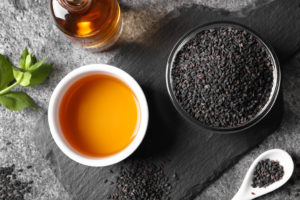
The interest in supplements seems to grow by the day, with many products touted as providing various health benefits.
The best advice if you’re curious about something? Check with your doctor first.
“As with many supplements, people tend to have an interest in taking them because they seem like a quick and easy fix,” said Kristi Veltkamp, registered dietitian with Corewell Health Nutrition Services. “My advice is to first work on having a better diet, eating whole foods, before you consider supplements.”
Black seed oil has gained some attention in recent months.
It’s important to recognize black seed oil is not a magic pill, Veltkamp said.
“Especially with herbal supplements, there just aren’t enough studies for us to understand fully their benefits,” she said. “As with anything you take, talk to your doctor first, because some supplements do interact with some medications.”
Black seed oil has been around as an herbal supplement for years—thousands of years, in fact.
“Nigela sativa, otherwise known as black seed or black cumin, has been used as a remedy for 2,000 years,” Veltkamp said. “It has an active component called thymoquinone, and that can sometimes be beneficial in fighting inflammation, which is at the root of many diseases.”
Black seed oil can be purchased in capsule form or as an oil. It’s made from a flowering plant that grows in southern Europe, the Middle East and southwest Asia.
It’s sometimes applied topically for skin conditions such a psoriasis, eczema or acne, as well as being used for other health conditions.
“Yet there are very few studies of its effects,” Veltkamp said. “And those are almost entirely studies done on animals.”
One of the few human studies done on black seed oil has related to skin conditions. The study showed some benefits for acne in some participants.
For other conditions—diabetes, obesity, or liver and kidney conditions, for example—benefits were minimal or non-existent, according to the U.S. National Library of Medicine National Institutes of Health.
Larger studies would be necessary to reach reliable conclusions about any benefits, Veltkamp said.
Black seed oil may reduce blood pressure, so individuals with naturally low blood pressure should avoid it.
Black seed oil does provide some essential vitamins and minerals. At 45 calories per teaspoon of the oil, it contains calcium, iron, zinc, copper, thiamin, niacin, phosphorous and folic acid.
The better choice if you’re looking for a daily supplement? Take vitamin D3.
“Especially in Michigan winters, we don’t have enough sunshine or spend enough time outdoors to get as much D3 as we need,” Veltkamp said. “We need D3 to keep our immune systems strong. A healthy diet and vitamin D3 are your best options.”
 /a>
/a>
 /a>
/a>
 /a>
/a>